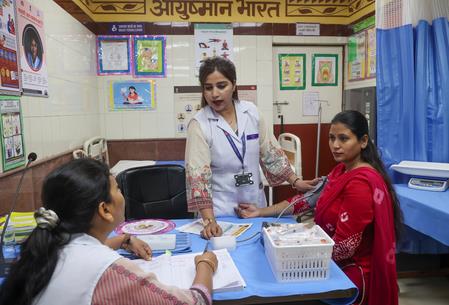Govt Eases Norms For Opening Jan Aushadhi Kendras In Metro, 'Million-Plus Cities': Report
The easing of distance norms will help boost the outreach of the pharmacy chain, which aims to provide quality medicines to the people at affordable prices.
The report cited an internal document issued on September 10 by the Pharmaceuticals & Medical Devices Bureau of India (PMBI), the department responsible for implementing the scheme.
“With a view to enhancing public accessibility, equitable distribution, and wider outreach of Jan Aushadhi Kendras, especially in densely populated urban agglomerations, it has been decided to incorporate the following modifications in the extant guidelines concerning minimum-distance requirements in the scheme," the document read.
As per the document,“there will be no requirement to maintain minimum distance between any two Jan Aushadhi Kendras in seven metropolitan cities -- Delhi, Mumbai, Kolkata, Chennai, Bengaluru, Hyderabad, and Ahmedabad".
In addition, relaxation will also apply to cities with a population of more than one million, based on the 2011 Census – known as the 'Million-Plus Cities'. These cities will not be required to maintain a minimum distance, except in cases where a Jan Aushadhi Kendra has not completed a period of two years from the date of its opening, the report said.
The million-plus list includes 46 urban agglomerations including major centres like Pune (5.05 million), Surat (4.59 million), Jaipur (3.07 million), Kanpur (2.92 million), Lucknow (2.9 million), Nagpur (2.5 million), Ghaziabad (2.36 million), Indore (2.17 million), Coimbatore (2.15 million), and Kochi (2.12 million).
For smaller towns and other urban areas not covered under these categories, the existing norms remain in force, the report said.
From just 80 in 2014, a total of 16,912 JAKs have been established under the flagship scheme, the Pradhan Mantri Bhartiya Janaushadhi Pariyojana (PMBJP), till June 30. It made essential medicines more accessible to people and reduced the out-of-pocket expenditure. These government pharmacies provide generic medicines, which are available at lower prices but are equivalent to expensive branded drugs in quality and effectiveness.

Legal Disclaimer:
MENAFN provides the
information “as is” without warranty of any kind. We do not accept
any responsibility or liability for the accuracy, content, images,
videos, licenses, completeness, legality, or reliability of the information
contained in this article. If you have any complaints or copyright
issues related to this article, kindly contact the provider above.
Most popular stories
Market Research

- Japan Buy Now Pay Later Market Size To Surpass USD 145.5 Billion By 2033 CAGR Of 22.23%
- BTCC Summer Festival 2025 Unites Japan's Web3 Community
- GCL Subsidiary, 2Game Digital, Partners With Kucoin Pay To Accept Secure Crypto Payments In Real Time
- Smart Indoor Gardens Market Growth: Size, Trends, And Forecast 20252033
- Nutritional Bar Market Size To Expand At A CAGR Of 3.5% During 2025-2033
- Pluscapital Advisor Empowers Traders To Master Global Markets Around The Clock






















Comments
No comment